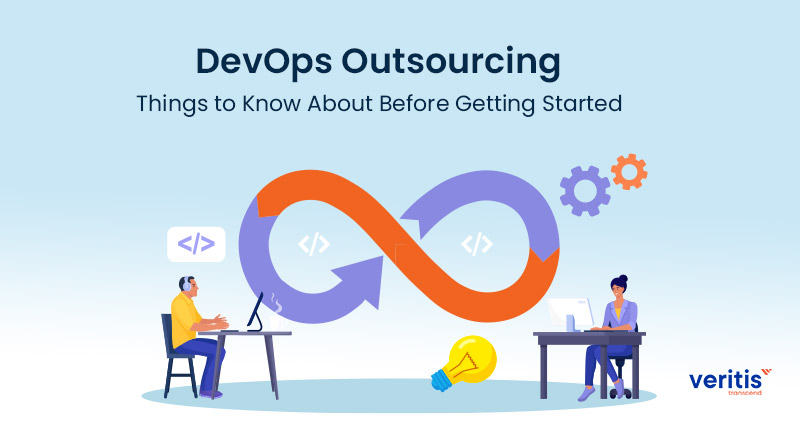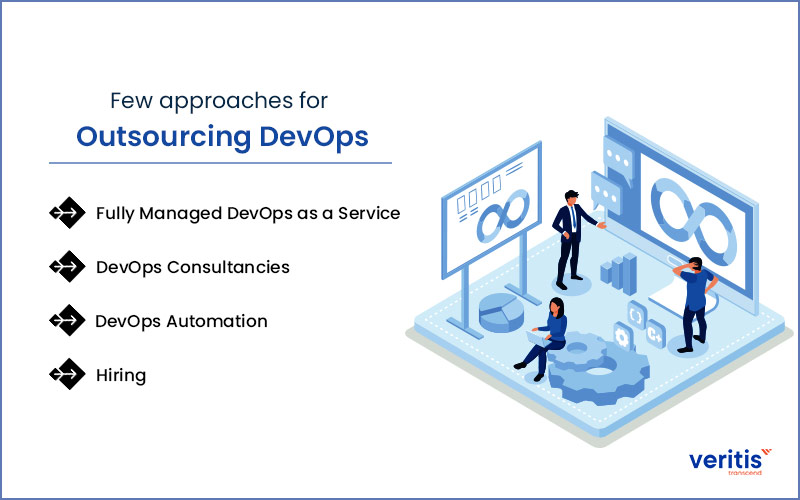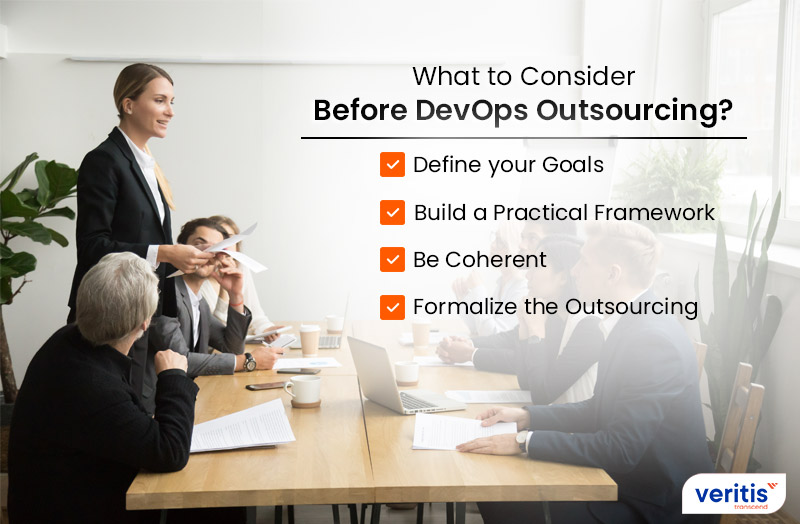DevOps outsourcing: Things to Know About Before Getting Started

DevOps is a set of procedures and a collaborative mindset to streamline operations and enhance IT infrastructure. Many firms worldwide are eager to complete this digital transformation since switching to DevOps methodologies and processes dramatically improves software delivery and maintenance operations. The main issue is that it’s not always viable, much alone practical, to create an internal DevOps engineers’ team. Before a corporation to profit from an internal DevOps team, it must undergo a protracted and expensive cultural change since DevOps engineers are expensive and can only function efficiently when adhering to the DevOps principles and ethos.
Your development and operations teams’ silos are broken down by using DevOps services. You can use it to speed up software delivery, automate processes, implement changes successfully and on schedule, and improve the dependability of the process.
When you think about all the difficulties in creating your own DevOps engineers team, DevOps outsourcing as a managed service makes a lot of sense, especially for startups and business owners. You can get specialized skills through outsourcing, just like marketing, graphic design, or legal counsel, without having to incur the financial and administrative costs of bringing these services in-house.
The best solution for the aforementioned problems is to outsource DevOps implementation. This blog post will cover every aspect of DevOps outsourcing, including its advantages and approaches to outsourcing. This blog also covers how to start using it, how to make it work well, and how to pick the best DevOps partner based on your DevOps outsourcing requirements.
What is DevOps Outsourcing?

A distribution strategy for a collection of tools called DevOps as a Service encourages communication between a company’s operations staff and software development team. In this delivery model, the DevOps as a Service provider offers many tools that cover different facets of the overall process and links these tools so they may function as a single entity. An internal best-of-breed toolchain strategy, in which the DevOps team employs a disjointed collection of independent technologies, is the antithesis of DevOps as a Service.
Every activity taken during the software delivery process should be able to trace, according to the philosophy of DevOps as a Service. The DevOps as a Service technology enables the organization to effectively use continuous integration (CI) and continuous delivery (CD) to create business value. , DevOps engineers inform the developer group when an issue is found in the production environment.
If done right, outsourcing DevOps is an approach that may give businesses rapid access to highly qualified personnel knowledgeable about DevOps transformation and DevOps implementation without the hassle and expense of setting up in-house DevOps teams.
Useful link: DevOps Implementation: 4 Steps to Success
How does DevOps as a Service work?
The DevOps methodology for software development emphasizes the culture and procedures that enable the development and operations teams to function as a single unit. The two departments’ cooperation will be improved in order to accelerate the software development lifecycle (SDLC).
As a result, there is no one best technique regarding DevOps outsourcing, and every special project calls for a customized strategy. The DevOps as a Service provider will review the project’s scope of work and reach an individual case-by-case agreement on services.
The vendor can work with you as a partner and support testing, delivery pipelines, continuous development, and integration in multiple ways.
Below are a few Approaches for Outsourcing DevOps:

1) Fully Managed DevOps as a Service:
End-to-end DevOps services are included. Here, the outsourcing provider collaborates with your own staff to develop, test, and deploy cloud-based infrastructure and applications continuously and automatically. The DevOps engineers assist your business in creating procedures from the beginning (including the four continuous stages of the DevOps workflow) and even implementing the DevOps practices to work with your current infrastructure and user needs.
2) DevOps Consultancies:
Here, the DevOps engineers evaluate your current procedures, give advice on how to make them better, and assist in putting the required changes into place so that you can achieve your business objectives the DevOps way.
3) DevOps Automation:
To speed up results and establish a trustworthy automated testing environment, you can outsource automation to a DevOps services company.
4) Hiring:
The vendor also offers the option to hire dedicated DevOps engineers for a protracted project. Let’s look at the services that DevOps as a Service allows you to outsource to have a better understanding. Standard offshore and nearshore outsourcing partners provide services across a variety of fields. The specs can be adjusted to the organizational objectives, project requirements, application structure, team structure, and financial constraints of the clients.
DevOps is becoming a widely used capacity for agility. However, enterprises have trouble implementing DevOps practices effectively. One of the primary causes is the lack of DevOps expertise, as well as the high cost of hiring, training, and addressing skill shortages. These problems, however, may be resolved by DevOps outsourcing, particularly for startups wishing to use DevOps and Agile for speedy and secure development. Let’s talk about some more of its advantages below.
Useful link: Why Should You Adopt DevOps and What are the Benefits it Offers?
DevOps as a Service Advantages
Organizations without internal DevOps experience or the funding to hire or educate staff with such capabilities may find DevOps as a Service appealing. However, the DevOps outsourcing strategy also obscures the difficulties of managing the flow of data and information up and down the toolchain. Without learning how the complete toolchain functions, the various people and teams participating in the DevOps process may utilize easy interfaces to get the tooling they need.
A developer might use source code management tools, a tester could examine application performance management tools, and the IT operations team could make changes using configuration management tools, all utilizing the same DevOps as a Service offering. DevOps as a Service seeks to enhance collaboration, monitoring, administration, and reporting by combining specific DevOps tools components into a single overall solution. A firm may adopt a more flexible approach to its markets and provide new goods and services as the market evolves with the help of an efficient DevOps as a Service strategy. Traditional development and deployment procedures can coexist with DevOps and DevOps as a Service.
Recruitment is made simpler and more affordable by outsourcing DevOps. As outsourcing businesses offer experienced specialties with all the necessary credentials in one location, you can skip the drawn-out and expensive hiring procedure.
Additionally, there is no need to invest time or resources in training an internal workforce. Also, hiring a remote staff reduces certain financial concerns because the outsourced business will pay for any taxes, software licensing, office rent, and others.
Companies that outsource have more experience since they have tried and evaluated multiple methods and solutions. They have experience in many different fields thanks to their extensive project experience.
Additionally, outsourcing companies pay close attention to their staff members’ technical abilities and make sure they stay current with emerging technologies by enrolling them in online courses and granting them certifications.
Access to experts like database administrators, and site reliability engineers is another benefit of outsourcing DevOps. Obtaining experts with uncommon or specialized skills may be more challenging when building an internal team of DevOps engineers if finding DevOps engineers is already challenging. The ability to pick from a variety of DevOps talent through outsourcing allows you to spread your responsibilities more effectively and assign specialists to challenge jobs.
DevOps as a Service Disadvantages
It is assumed in discussions about DevOps as a Service offers that there is consensus on a single, comprehensive toolchain for DevOps implementation that successfully fits the demands of any company, much less one that a provider might supply in a managed services model. From the software development process to deployment into production most DevOps toolchains include some sort of CI/CD pipeline and monitoring capabilities, although needs and preferences may differ amongst businesses.
Compared to specialized study and selection of best-of-breed technologies integrated inside, a DevOps managed services model may restrict an organization’s options for tools and particular capabilities. Fewer options for specific tools, whether they be their own or those of partners, may be provided by DevOps service providers.
Tradeoffs between speed and security, as well as a service provider’s capacity to fulfill availability and reliability standards, are other possible issues with a DevOps-as-a-Service model. To keep expenditures in check, a company must closely monitor how it uses services and related technologies.
Useful link: Pros and Cons of DevOps Methodology and its Principles
What to Consider Before DevOps Outsourcing?

DevOps outsourcing or DevOps as a Service is quite different from regular outsourcing arrangements. DevOps is a wide and confusing topic, therefore there is no one solution that works for everyone. Here is a step-by-step guide to beginning DevOps, picking the best partner, and making it successful for efficient DevOps outsourcing.
1) Define your Goals
DevOps outsourcing is not just about outsourcing the responsibilities and reducing costs but also about increasing productivity and amplified agility. Along with these, the organization has various other goals which you want to be solved by DevOps.
It would be better to list out the objectives that you want the DevOps solution to solve. This would help you communicate better with the DaaS provider. Additionally, this process would help you select your DaaS provider as your criteria would be clear. The criteria, or key performance indicators (KPIs), can range from scalability to 24×7 support.
This step also allows the DaaS provider and you to be on the same page regarding the requirements of the DevOps project. Additionally, the deadlines and other essential project milestones will be shaped by this step.
2) Build a Practical Framework
DevOps depends heavily on teamwork, therefore, outsourcing needs a governance architecture that identifies the key players, procedures, and tools. The client is familiar with the application, customer persona, and end goals, whereas the DevOps services provider, brings an outside view of the business needs. So, utilizing TOM (Targeted Operating Model) to assist reduce disparities and create teams with the same mentality, may create a successful partnership.
Utilizing interconnected elements like roles and duties, reviews, organizational structure, people, processes, and tooling, you may utilize TOM to design a governance framework. Additionally, you may choose the finest governance components and include them in the model for better DevOps outsourcing results.
3) Be Coherent
The secret to effective outsourcing, and DevOps is no different, is communication. You must confirm that your DevOps partner has an effective communication strategy in place as well as effective communication capabilities. By talking with them via a variety of channels and observing how professional they are, you may evaluate their abilities.
Once you’ve chosen a vendor, collaborate with them to create a communication plan that outlines the work, timeframes, each party’s roles, and how required modifications or upgrades will be implemented.
4) Formalize the Outsourcing
Once you’ve chosen a vendor, it’s time to formalize your agreement with a contract. Because a DevOps firm may provide a range of solutions, it boils down to cooperation and price models. We have covered the DevOps outsourcing models in great detail in the following part to assist you in making the best decision.
However, DevOps does not have a defined scope when used in conjunction with agile development. It takes a distinct tack when it comes to contracting and cooperation methods, as well as the outsourcing scoping process. The change from closed-scope contracting to open-scope contracting has had the most impact.
There are two types of contracts: Closed scope and open scope. A closed-scope contract considers functional and technical designs and definitions of result-oriented services, tools, and roles. It is predicated on (more or less) unchanging circumstances and managed work practices.
Innovation, operations, and culture are all incorporated within open-scope contracts. It considers a stream of value creation, delivery, and management that are in line with the constantly shifting demands of the market and users.
If you take into account the dynamic nature of software engineering with DevOps, constantly shifting requirements, cultural change, etc., you can also think about T&M (Time and Material) contracts as an alternative to fixed-price agreements. In conclusion, create a value-driven outsourcing agreement with the vendor that outlines the DevOps roadmap and provides flexibility for future changes.
Capping it Off
DevOps is the approach that most growing companies are adopting. Given its potential, most organizations are executing the methodology and ingraining their work culture with the DevOps tools. However, given the paradigm shift it brings in, most companies can’t cope with the changes it brings. That’s why Stevie Award winner Veritis is the preferred choice for DevOps outsourcing requirements. We have provided services and solutions to emerging and Fortune 500 companies. So, reach out to us and walk away with a DevOps solution that suits you best.
Got Questions? Schedule A Call
Additional Resources:
- Waterfall Vs. Agile Vs. DevOps- Which Production Method Should You Take?
- How to Implement Artificial Intelligence in DevOps Transformation?
- Measuring DevOps: Key ‘Metrics’ and ‘KPIs’ That Drive Success!
- 6 DevOps Technical Benefits To ‘Startup’ Firms
- DevOps – A Perfect Fit in ‘Digital Transformation’ Journey